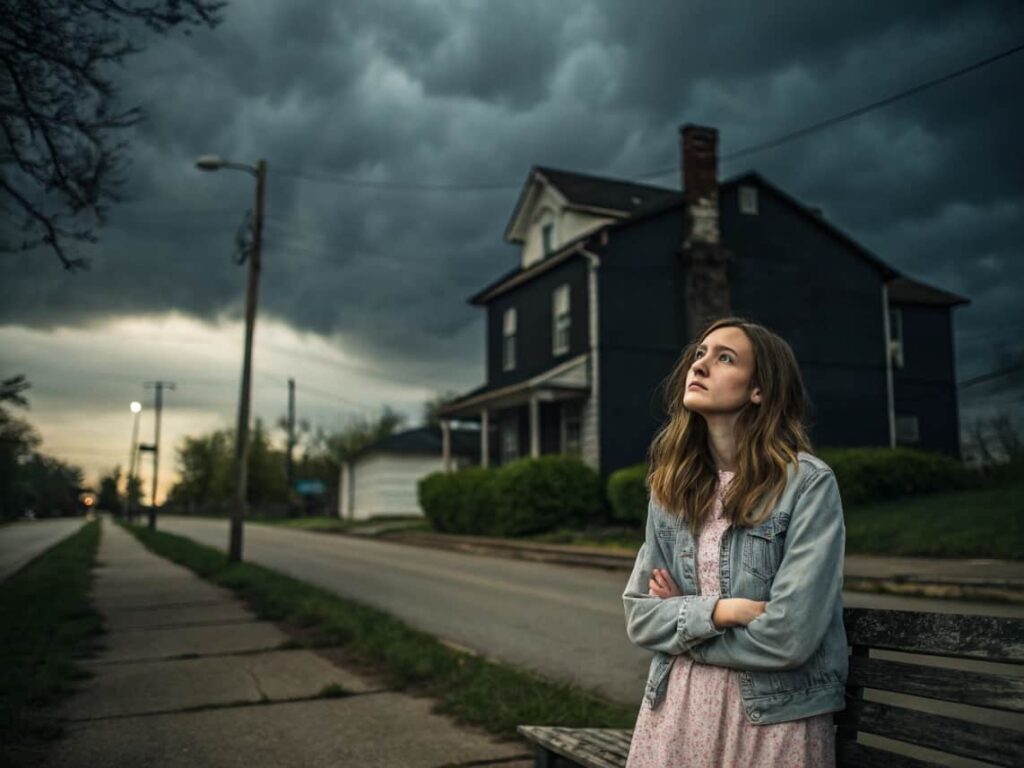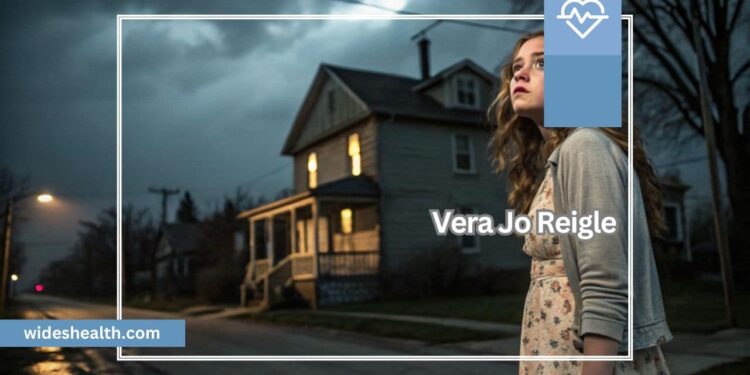There are moments in life when you come across a story that stays with you forever. For me, that story was about Vera Jo Reigle. I remember the exact moment I watched the documentary “Goodnight, Sugar Babe: The Killing of Vera Jo Reigle”. At first, I thought it was just another true crime story. But within minutes, I realized I was wrong.
This wasn’t just a murder mystery. This was the heartbreaking tale of a vulnerable young woman who was betrayed by almost everyone she trusted — her partner, the people she lived with, and sadly, even the system meant to protect her.
Who Was Vera Jo Reigle?

Vera Jo Reigle was a young woman from Findlay, Ohio. She had a developmental disability, which made her mentally younger than her actual age. But despite that, people who knew her said she had a sweet nature. She was someone who smiled easily and tried to find love and acceptance.
But life was never kind to Vera. She had a tough upbringing, and things only got worse when she got involved with a family that would eventually destroy her — the Brooks family. They saw her vulnerability as something to exploit. Vera hoped for love but found cruelty. Her story is one of deep betrayal and unimaginable suffering.
The Key Features of Vera Jo Reigle’s Story:
- Awareness and Advocacy: Vera Jo’s case highlights the importance of raising awareness about abuse, particularly for those with disabilities. It encourages society to be vigilant, speak up, and protect vulnerable individuals.
- Social Justice and Legal Reform: The tragic story underscores the need for stronger legal protections and social systems for vulnerable people. Vera’s story can inspire future reforms in the way cases of abuse and exploitation are handled.
- Emotional Impact and Community Action: Vera Jo’s story leaves a profound emotional impact on communities. It serves as a reminder that silence can be dangerous and that society must act to prevent harm and provide support to those in need.
These features can be used to promote action, understanding, and support for victims of similar situations.
Falling into the Wrong Hands:
Vera’s life took a dark turn when she became romantically involved with Zachary Brooks, the son of Cheri Brooks — the matriarch of the family. Cheri was no ordinary woman. She was controlling, manipulative, and often acted like she ran her own little kingdom.
She had a strange and dangerous level of control over the people in her home. When Vera became pregnant with Zachary’s child, things went from bad to worse. Instead of receiving support and love during her pregnancy, she was trapped further in an abusive and twisted household.
Abuse That Became Normal:
What hurts me most is that Vera stayed with the Brooks family, even as the abuse worsened. But when you’re mentally challenged, scared, and isolated, it’s easy to believe you don’t have a choice. The abuse wasn’t just physical — she was emotionally and mentally tortured.
She was denied food, beaten, and humiliated regularly. And while all of this was happening, multiple agencies, like child services and local police, had already been involved in her life. But no one stepped up to truly protect her. Vera failed at every level. Sometimes, I imagine what it would feel like to be in her place — completely alone, being hurt every day, and still hoping someone might save you. It’s heartbreaking.
The Night of Her Murder:
In March 2011, Vera Jo Reigle was brutally murdered by Daniel Bixler and his girlfriend, Nicole Peters, both connected to the Brooks family. They beat, stabbed, and left her near train tracks like she meant nothing. Watching the documentary footage broke me.
Vera didn’t just die; she was tortured. What’s worse is that people around them laughed afterward. How could anyone be so cruel? The most shocking part? Cheri Brooks, who many believe planned it all, was never charged. It feels like justice was never fully served for Vera.
Watching the Documentary – My Reaction!
When I watched the documentary about Vera’s life and death, it felt like someone punched me in the chest. I kept asking myself, “How could this happen in a country with so many systems to protect the vulnerable?”
But the more I watched, the more I realized the truth: the system didn’t protect Vera — it failed her. Time and time again.
What made me feel sick was the way members of the Brooks family spoke on camera. They laughed. They blamed Vera. Some even said she deserved it. Their complete lack of remorse chilled me to the bone.
A Victim of Control and Fear:
One thing that stood out was how much control Cheri Brooks had over everyone around her. It was like she brainwashed them. People were scared to say no to her. Even Zachary, Vera’s boyfriend and the father of her child, was under her control. Vera was surrounded by people who treated her like less than human. And because of her disability, she couldn’t fight back the way others might. She was trapped — emotionally, mentally, and physically.
A Broken System:
What frustrates me most about Vera Jo Reigle’s case is how many warning signs were ignored. Teachers, social workers, police officers — so many people knew she was at risk, but no one truly helped. She had bruises. She showed fear. She was isolated. Still, no one stepped in. This wasn’t just a case of murder. It was a complete breakdown of the system. Vera wasn’t invisible, but she was treated like she didn’t matter.
Why Vera’s Story Still Matters?
It’s been over a decade since Vera Jo Reigle’s tragic murder, but her story continues to resonate deeply. Vera’s life and death highlight the vulnerability of people with disabilities, victims of abuse, and those who feel powerless to speak out.
Her case serves as a harsh reminder of how easily society can overlook those who need help the most. Vera’s story is not just about a brutal crime; it’s a call to action. It urges us to pay attention, take responsibility, and ensure that no one falls through the cracks again.
What Can We Learn?
The story of Vera Jo Reigle teaches us several crucial lessons. First, we must listen when someone seems scared or is in trouble, offering support and understanding. If we witness abuse, we should speak up and take action instead of staying silent.
It’s essential to believe victims, particularly those with disabilities, who may struggle to defend themselves or be heard. Finally, we can’t always rely on the system to take immediate action. Sometimes, we need to be the voice for those who can’t speak for themselves, to protect them and help make things right.
The Disturbing Motive-2 A Baby at Any Cost:
The Obsession with the Unborn Child:
The Brooks family, particularly Cheri, became dangerously fixated on Vera Jo’s unborn child. Vera Jo was pregnant with Zachary Brooks’ baby, and the family desperately wanted a baby girl. Their intense obsession with having a girl overshadowed everything else, dehumanizing Vera Jo and reducing her to a mere vessel for their desires.
Vera Jo’s Usefulness Faded:
Once Vera Jo’s pregnancy was no longer viewed as useful to the Brooks family, she was discarded. Her value was solely based on her pregnancy, and when that no longer served their purposes, she became expendable. Tragically, this led to her abuse and eventual murder, marking the end of her life.
Benefits of Vera Jo Reigle’s Story:
Raising Awareness:
Vera Jo’s story raises awareness about the abuse faced by vulnerable individuals, especially those with mental disabilities. It sheds light on their struggles, encouraging us to recognize their experiences and speak out against the injustices they endure. Her case highlights the need to ensure that these individuals are heard and protected.
Encouraging Advocacy:
Vera’s case serves as a powerful reminder to speak up for those who cannot defend themselves. It motivates us to become advocates, standing up for vulnerable individuals and ensuring they receive the protection they deserve. Advocacy can make a significant difference in improving the lives of those at risk of abuse.
System Reform:
Vera Jo’s tragic story calls attention to the flaws in the legal and social systems meant to protect vulnerable individuals. It encourages the need for reforms to ensure that these systems are stronger and more effective, safeguarding people from abuse, neglect, and exploitation. Changes are necessary to prevent similar cases in the future.
Tips for Supporting Vulnerable Individuals:
- Stay Alert: If you suspect someone is being abused or manipulated, speak up. Don’t ignore the signs or assume it’s not your responsibility. Recognizing warning signs can be crucial in preventing further harm, and early intervention can save lives.
- Support Victims: Offer emotional or practical help to those who are being mistreated, especially people with disabilities who may feel trapped or powerless. Providing a safe space and support can give them the strength to seek help and break free from harmful situations.
- Educate Others: Share knowledge about abuse, exploitation, and the importance of mental health care. By educating others, you increase awareness and help more people recognize the warning signs, ensuring a collective effort to protect those who are vulnerable.
Future Plans for Protecting Vulnerable Individuals:
Future plans to protect vulnerable individuals include advocating for legal reforms to strengthen protections within legal and social systems. This involves pushing for stricter laws and better enforcement. Community education campaigns will raise awareness about recognizing abuse and the importance of taking action to prevent harm.
Additionally, providing support for victims through comprehensive systems, including emotional, psychological, and legal assistance, will give them the tools to heal and rebuild their lives. Together, these efforts aim to create a safer, more supportive environment for all.
FAQS:
Who was Vera Jo Reigle?
Vera Jo Reigle was a young woman with a developmental disability from Findlay, Ohio. Despite her challenges, she had a sweet and caring nature, but her life was tragically cut short when she was manipulated, abused, and murdered by the very people she trusted.
What led to Vera Jo’s tragic death?
Vera Jo’s death was a result of manipulation and abuse by the Brooks family. They were obsessed with her unborn child, and once she was no longer deemed useful to them, she became expendable. Her life ended in a cruel and unnecessary tragedy.
Why is Vera Jo’s story still relevant today?
Vera Jo’s story serves as a reminder of the vulnerabilities of individuals with mental disabilities and how easily they can be overlooked or mistreated. It emphasizes the need for better protection, support, and advocacy for such individuals in our communities.
What lessons can we learn from Vera Jo’s story?
Vera Jo’s story teaches us to recognize and act on signs of abuse, especially when it involves vulnerable individuals. It encourages us to speak up, protect those in need, and ensure that systems are in place to safeguard them from harm.
How can we help prevent similar tragedies from happening?
Raising awareness, speaking up when we see abuse, supporting victims, and pushing for stronger legal protections are essential steps. By educating ourselves and others, we can create safer communities where vulnerable individuals are treated with the care and respect they deserve.
Conclusion:
Vera Jo Reigle’s tragic story highlights the exploitation and abuse faced by vulnerable individuals, particularly those with mental disabilities. Despite clear signs of mistreatment, Vera was repeatedly failed by systems meant to protect her.
Her life ended in cruelty and betrayal, underscoring the urgent need for stronger legal protections and more robust advocacy for vulnerable people. Vera’s case serves as a stark reminder for society to remain vigilant, speak up against abuse, and ensure that vulnerable individuals are given the care and protection they deserve to prevent such tragedies from recurring.











